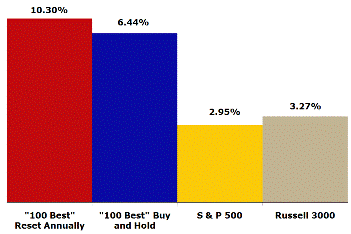Podcast: Play in new window | Download
Friends,
Pop quiz: What do the following five firms have in common?
Ernst & Young
Plante & Moran
Deloitte
Pricewaterhousecooper
KPMG
Easy, right? Top accounting firms in the country – in fact the top four, plus Plante & Moran (the great Michigan-based firm – 12th in the country and steadily growing). They count the beans, watch pennies, and search for ROI. But what else do they have in common?
Answer: They are all – again – on the Fortune magazine list of “100 Best Companies to Work For.” There is a major lesson here: “doing good” by your employees helps you “do well” with your bottom line. This is not some touchy-feely, goopy ya-ya. Indeed, the research conducted by the Russell Investment Group demonstrates that these “100 Best to Work For” have consistently outperformed the S&P 500 by an order of three to four to one.*

I’d suspect that for every CEO in America two questions should follow heavily on the footsteps of these dramatic facts: First, how do you know if you have such a company? And second: How do you become (more) the kind of company that people want to work for? The answer to the first question is: apply to become such a company, and they will ask your employees (those anonymous scores account for 2/3 of the judging), and share your results with you. You can also check out the Great Place to Work Institute to learn more and to receive advice from that firm on what it’s all about.
And what’s the secret to these companies? So easy. So deceptively easy. In a word: it comes down to T-R-U-S-T, trust. Let’s explore that more in the weeks to come.
But maybe ask yourself this week these unusual questions:
(1) Why DO people trust me?
(2) What do (different) people see that limits the amount of trust they have in me?
The answers are vital as you strive to
Lead with your best self!
Dan
* Chart from http://www.greatplacetowork.com/what_we_believe/graphs.php

Mr. Mulhern you forgot to mention 2 other great Michigan companies that made the top 100, Stryker Corpation in Kalamazoo and Quicken Loans in Detroit. Thanks.
I sure did. Entirely my bad!
Tribalism is one reason people trust me or for the same reason other people distrust me. How ofetn have you heard a person use the phrse, “the other side?” I have heard this is politcs and religion. This kind of thinking is successful at making many persons ignore what the opposition has to say or writes. Merely by declaring them the other side, anything they present is suspect. This is why a few political groups today are said to act like Nazi’s. They demonize “the other side,” so much so that their adherants are held in a something like a cult atmosphere, while those on the other side are easily made the subject of jokes, humiliation, and I could go on.
In business we see tribalism, when we see who sits together and who avoids whom. Who is the favorite and who does not get invited to the influential social gatherings, or who is not told about some of the meetings, or does not get the memo. Isolation is a fearful force. I have read that some psycholgists rate being alone’ isoloation as the most fearful condition a person can experience.
If a person identifies themselves as belong to a group, they are then fodder for contol based on wanting to belong and be accepted. Or if a person. while not strongly think of themselves as belonging to a group, but follows its pattersn of behavior and beliefs, then they also are easily lead. Giving justifiable trust is a matter of being able to determine if one is being fairly or unfairly lead, whether one’s personal beliefs are being turned against your own interests, or being used to advance them.
Dan, you hit the nail square. Trust, respect, inclusion and honesty. If you have those elements in the work place you probably have a an engine that’s tuned with well lubricated parts. Glad you are still keeping up RFL. Also, anxiously awaiting for reports about your transition to the Sunny Side of the Country.
Jim
Prospective employees are attracted to these five companies by what they have heard from others, including current employees. For a company to become an employer of choice, there are six ingredients in the formula to turn the heads of job candidates:
http://www.associatedcontent.com/article/6254602/turning_heads.html
Dan,
Sorry to use this for personal contact but wondering if you received my e-mail last week?
Kath
I think people trust with their instinct, and mislead their selves with analysis and second guessing. People trust me because I speak honestly and (for the most part) clearly even if I’m wrong. I admit when I’m wrong or when I’ve made an error that I feel should be corrected. Im reliably intelligent and apt to listen. When I come down on people it’s usually because I see a problem in their comport, thinking or behavior. And I’m willing to undergo criticism when I find it’s well founded.
Some people trust based on prejudices. Trust me because I’m tall, or white, handsome, or don’t have a gravelly voice. Others distrust for the same reasons. Surprisingly many people judge based on prejudices and form those prejudices on stereotypes.
Some people judge based on comfort. I think that’s safely instinctive. It mitt lead to an insular life, but, whatever works. Some people don’t evertrust, ever.